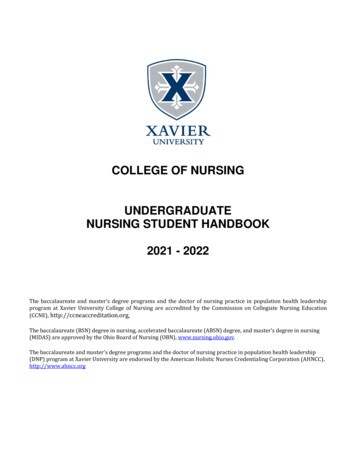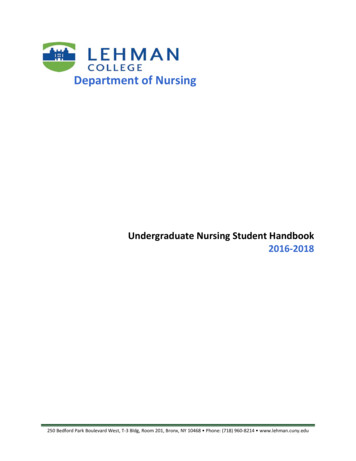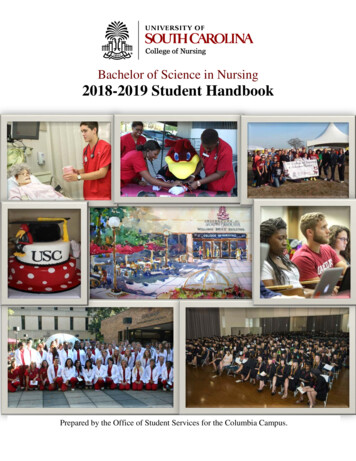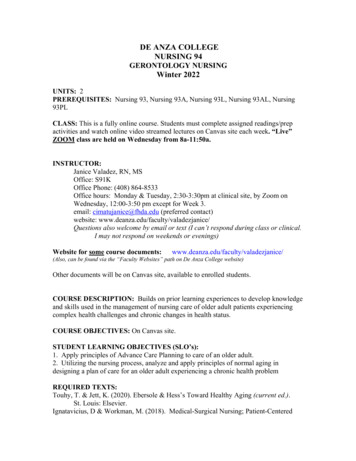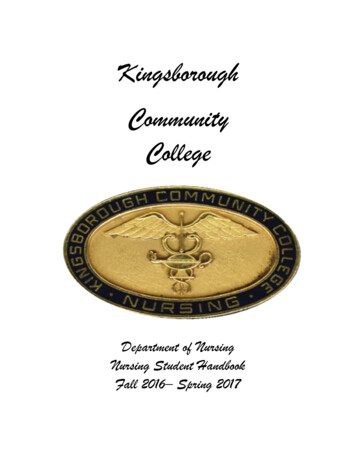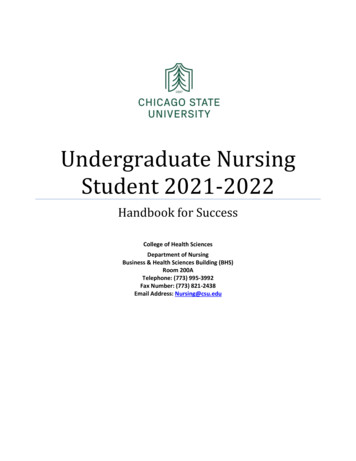
Transcription
Undergraduate NursingStudent 2021-2022Handbook for SuccessCollege of Health SciencesDepartment of NursingBusiness & Health Sciences Building (BHS)Room 200ATelephone: (773) 995-3992Fax Number: (773) 821-2438Email Address: Nursing@csu.edu0
Table of ContentsPreface . 7Greetings Nursing Student! . 8WELCOME TO THE DEPARTMENT OF NURSING . 9GENERAL INFORMATION . 10History of the Nursing Program . 10Professional Accreditation . 10University Accreditation . 10MISSION, VISION AND VALUES OF CHICAGO STATE UNIVERSITY . 11University Mission Statement . 11Vision . 11Values . 11MISSION, VISION AND VALUES FOR THE COLLEGE OF HEALTH SCIENCES . 12College Organizational Chart . 12MISSION, VISION AND VALUES FOR THE DEPARTMENT OF NURSING . 13Department Mission Statement . 13Vision . 13Core Values . 13PHILOSOPHY OF THE DEPARTMENT OF NURSING . 14Beliefs . 14CURRICULUM STRANDS . 14Rationale . 14Horizontal Strands. 14Vertical Strands . 15CARING CONCEPTUAL FRAMEWORK . 18Student Learning Outcomes . 19POLICIES AND PROCEDURES . 21Student Professional Code: . 21Professional Behavior . 22Policy for Electronic Devices and Social Networking . 23POLICY STATEMENT REGARDING CONFIDENTIALITY . 25Attendance . 251
Communication Protocol . 28Dress Code . 29Examinations . 30Grading Scale. 30Health Policies . 30Learning Management System (LMS): Moodle . 31Mailboxes . 31Physical Resources . 31CLINICAL ROTATION POLICIES AND PROCEDURES . 32Cardio Pulmonary Resuscitation (CPR) Certification . 32Confidential Information. 32Annual Clinical Requirements . 33Vaccinations and Proof of Immunity . 33Criminal Background Check and Drug Screening . 34Health Insurance . 34Professional Liability Insurance. 35Program Fee . 35Additional Needs and Responsibilities for Clinical . 35Clinical Transportation . 36Clinical Skills Checklist . 36Clinical Attendance . 36Clinical Skills Medication Exam Policy and Clinical Progression . 36Requirements . 36Clinical Failure . 37RESPONSIBILITIES OF THE STUDENT AS A LEARNER IN THE NURSING PROFESSION . 38Codes of Conduct . 38Netiquette Guidelines . 38AMERICAN NURSES ASSOCIATION CODE OF ETHICS . 39PROVISION 1 . 39PROVISION 2 . 39PROVISION 3 . 39PROVISION 4 . 392
PROVISION 5 . 40PROVISION 6 . 40PROVISION 7 . 40PROVISION 8 . 40PROVISION 9 . 41STANDARDS OF PROFESSIONAL CONDUCT FOR REGISTERED PROFESSIONAL NURSES. 41MANUAL DEXTERITY – (Activities/Attributes) . 42MOBILITY – (Activities/Attributes) . 42PROCESSING PATIENT INFORMATION – (Activities/Attributes) . 42MATH COMPETENCY – (Activities/Attributes) . 43EMOTIONAL STABILITY – (Activities/Attributes) . 43COGNITIVE PROCESSING – (Activities/Attributes) . 43CRITICAL THINKING – (Activities/Attributes) . 43INTERPERSONAL/COMMUNICATION SKILLS – (Activities/Attributes) . 44ADMISSIONS POLICY . 44Admission to the Department of Nursing . 44PHASE 1. 44PHASE 2. 44Certified Nursing Assistants (CNA): . 45READMISSIONS POLICY . 46Readmission to the Department of Nursing . 46POLICY AND PROCEDURES . 50Nursing Student Responsibilities and Expectations . 50Professional Behaviors . 50Policy for Grading Undergraduate Clinical Courses . 54Satisfactory . 54Unsatisfactory . 54PROGRESSION, RETENTION AND/OR DISMISSAL, GRADUATION . 55Curriculum Progression . 55Graduation Requirements . 58Academic Integrity . 58STUDENT DEVELOPMENT ACTIVITIES . 603
Nursing Advisors . 60Nursing Learning Resource Center (NLRC) . 60UNIVERSITY STUDENT SUPPORT SERVICES . 60Academic Computer Center . 60Academic Library . 61Campus Ministry . 61Career Development Center. 61Financial Aid . 61Office of Abilities . 62University Counseling Center . 62GRIEVANCE POLICY AND PROCEDURES . 65College-Level Student Grievance Procedures . 67APPENDIX A – PROFESSIONAL BEHAVIOR CHECKLIST . 70APPENDIX B – DEFINITIONS . 71APPENDIX C – REVISED BSN CURRICULUM PATTERN Fall 2016 . 72APPENDIX D – UNIVERSAL PRECAUTIONS . 74Handwashing . 74Personal Protective Equipment . 75Gloves . 75Gowns, Masks or Goggles . 75APPENDIX E – INCIDENT REPORT . 76APPENDIX F - COLLEGE OF HEALTH SCIENCES STUDENT GRIEVANCE FORM: PETITION FOR HEARING. 78APPENDIX G – GRIEVANCE PROCEDURE: ROUTING SHEET . 79COVID-19 . 80Notice of Disclaimer . 82Student Success Plan . 86Expected Outcomes of . 864
5
SECTION I6
PrefaceThis handbook is intended to provide students with reference information and toprovide answers to the most commonly asked questions posed by new and returningstudents as they progress through their undergraduate program.It is the responsibility of students to know and observe all regulations and proceduresrelated to the program they are pursuing. In no case will a regulation be waived or anexception granted because students plead ignorance of or contend that they were notinformed of the regulations or procedures. Each student receives the NursingUndergraduate Student Handbook at nursing orientation. It is the responsibility of thestudent to keep the handbook current.All statements and policies published in this Handbook are in effect for the timeperiod published on the cover of the Handbook. Faculty reserve the right to changestatements and policies during the year the Handbook is in effect, with the provisionthat students are informed in writing of any changes.7
Greetings Nursing Student!We are excited to welcome you back for the academic school year. As a CSUnursing student, it is our wish for you to know that nursing department team ishere to support you in this journey. Entrance into the nursing professionnationally is competitive, challenging, exciting, and rewarding.The Nursing Student Handbook for Success contains important informationregarding policies and procedures that will guide you as you progress in theprogram. This information will assist you in your admission process,progression, retention and the ultimate goal of graduation from the nursingprogram and the university. In addition, the handbook will assist in guidingyour expected professional conduct and behavior as you move on yourprofessional journey.We look forward to working with you as you prepare and enter therewarding profession of nursing.Again, thank you for choosing CSU’s Nursing Program for your professionaljourney, and best wishes for your continued success!Sincerely,Dr Erica AllenDr. Erica Allen, DNP, MBA, RNInterim Chairperson, Department of NursingBusiness and Health Sciences Building, Rm. 200A8
WELCOME TO THE DEPARTMENT OF NURSINGThe Student Handbook has been prepared especially for you by the faculty and staffmembers of the Department of Nursing. It contains important departmentalpolicies and procedures, which are intended to facilitate your successfulprogression through the nursing program here at Chicago State University.Knowledge of these policies and procedures will serve you well and help youskillfully navigate the academic policies at CSU.In order to abide by the policies and procedures as outlined in this handbook, you mustfirst be aware of them. We, therefore, strongly encourage you to read through thehandbook at your earliest convenience and refer to it as needed. Become familiarwith its content. If you have questions about any of the content, please speak witha member of the nursing faculty or your faculty academic advisor.We appreciate the opportunity to develop with you in meeting youreducational goal of becoming a baccalaureate prepared, highly skilled andcompetent professional registered nurse. We are pleased to have you here and willattempt to make your stay with us a pleasant and meaningful.Welcome to the Department of Nursing!Dean, Chair, Nursing Faculty and StaffInterim Chairperson, College of Health Sciences:Erica Allen, DNP,MBA,RNProfessor Charita Barlow-Walls, DNP,MSN, RNProfessor Nicholas Lino, DNP, MSNProfessor Dorothy Moore-Ahmad, MSN/Ed., CCRN, RN, BSNProfessor Guillaume Ngonmeudje, DNP, MSN, AGPCNP-BCProfessor Rupa Potti, DNP, MBA-HCM, RNProfessor Jerri Robinson, MSN, MPA, RNKarla Burnett, Chairperson Administrative Assistant9
GENERAL INFORMATIONHistory of the Nursing ProgramIn response to recommendations made by the Illinois ImplementationCommission on Nursing to increase the number of baccalaureate nurse graduatesin Illinois, Chicago State University conducted a feasibility study that led to theinitiation of the Division of Nursing at the University. In March of 1971, a directorand assistant director were appointed to develop a baccalaureate nursingprogram. Approval of the program was obtained from the Illinois Departmentof Registration and Education and the Illinois Board of Governors in 1972.During the summer of 1973, the first dean was appointed and in 1974, the Divisionbecame a College.The period between 1975 and 1980 were years of development and expansion. Theprogram received re-accreditation in 1989, 1997 and 2005. In 1992, the College ofNursing and the College of Allied Health were merged into the College of Nursing andAllied Health Professions that later became the current College of Health Sciences.Professional AccreditationThe Department of Nursing is approved by the Illinois Department of Financial andProfessional Regulations (IDFPR). The program is accredited by the AccreditationCommission for Education (ACEN).Program graduates of the Department of Nursing are qualified to apply to take theNational Licensure Examination for Registered Nurses (NCLEX-RN) examinationadministered by the National Council of State Boards of Nursing (NCSBN).Information abou t the NCL EX -RN examination may be obtained at:https://www.ncsbn.org/nclex.htm. After successful completion of thisexamination, the individual will be a registered nurse and will be fully qualifiedto practice professional nursing.University AccreditationChicago State University is accredited by the Higher Learning Commission of NorthCentral Association of Colleges and Universities.Reviewed by Nursing Faculty 08-16-2019, 8-18-202010
MISSION, VISION AND VALUES OF CHICAGO STATE UNIVERSITYUniversity Mission StatementChicago State University is a public, comprehensive university that provides accessto higher education for students of diverse backgrounds and educational needs. Theuniversity fosters the intellectual development and success of its student populationthrough a rigorous, positive, and transformative educational experience. ChicagoState University is committed to teaching, research, service, and communitydevelopment including social justice, leadership and entrepreneurship.VisionChicago State University will be recognized for innovations in teaching andresearch, and in promoting ethical leadership, entrepreneurship, and social andenvironmental justice. We will embrace, engage, educate, and empower ourstudents and community to transform lives locally and globally.ValuesChicago State University values: Intellectual developmentCreative and innovative thinking and learningDignity and unique talents of all personsResponsible choices and actionsPersonal and academic excellencePersonal, professional and academic integrityDiversityLeadership, service, philanthropy, social justice, and entrepreneurshipPride in self, community and the university11
MISSION, VISION AND VALUES FOR THE COLLEGE OF HEALTHSCIENCESCollege Organizational ChartDean of COHSContract AdministratorExecutive Assistant tothe DeanAcademicDepartmentsChair, Health StudiesFaculty & StaffChair, HealthInformationAdministrationFacultyService DepartmentsChair, NursingFacultyChair, OccupationTherapyFaculty & StaffDirector Health /Wellness Center &Student HealthInsurancePractitoners & Staff12
MISSION, VISION AND VALUES FOR THE DEPARTMENT OFNURSINGDepartment Mission StatementThe Department of Nursing adheres to the mission of the University and the College ofHealth Sciences, which is to provide access to higher education for residents of diversebackgrounds and educational needs locally, nationally, and globally.The mission of the Department of Nursing is to provide educational experiences thatempower learners, promote competence in the area of professional nursing,strengthen the capacity for employment in a variety of clinical practice settingswithin the healthcare community, and develop a sense of civic responsibility.VisionThe Department of Nursing seeks to educate nurses who will be able to demonstrateexcellence through practice, scholarship, leadership and service, while caring fordiverse populations.Through high quality and creative instruction, the faculty strives to provide anenvironment that is conducive to learning, stimulates intellectual inquiry, andencourages personal and professional growth. The faculty creates anenvironment that fosters scholarship, and a desire for life-long learning.The nursing faculty is sensitive to the unique characteristics of learners as theserelate to issues of access, retention, and graduation. The faculty strives to preparegraduates who are able to function as compassionate, caring professionals. Byproviding a high quality program, the faculty endeavors to prepare nursingleaders to meet the changing and comprehensive health needs of the community.Both faculty and learners attempt to create and strengthen community linkages in orderto develop collaborative research and service projects that will enhance the healthstatus of underserved communities.Core ValuesChicago State University’s College of Health Sciences, Department of Nursing values: CaringCompassionStimulate intellectual inquiryPersonal and professional growthScholarshipLife-long LearningReviewed by Nursing Faculty 08-16-2019, 8-18-202013
PHILOSOPHY OF THE DEPARTMENT OF NURSINGBeliefsThe faculty in the Department of Nursing believes that:1. Persons are self-determined, bio-psycho-social-spiritual-cultural beings whopossess inherent worth and dignity, who are capable of growth, and worthy ofrespect.2. Persons have basic human needs, which are essential to survival.3. Families as diverse-dynamic-social systems are interrelated andinterdependently linked with other systems.4. Nursing is a caring profession that provides services to society at any pointalong the wellness-illness continuum.5. The practice of professional nursing is an art and applied science.6. Preparation for the practice of professional nursing occurs in a baccalaureateprogram that integrates liberal arts and sciences, nursing theory and evidencebased practice.7. Health is dynamic state occurring along the continuum of high-level wellnessto death and is a basic human right.8. Teaching-learning is a dynamic, collaborative, reciprocal, life-long processof growth arising from interaction between educator and learner.Reviewed by Nursing Faculty 08-16-2019, 8-18-2020CURRICULUM STRANDSRationaleThe rationale for content organization and sequencing is based on theconvergence of the horizontal and vertical strands, which emanate from a caringframework. The horizontal strands are taught consistently through all courses andvary only according to factors in a given situation. The vertical stands flow throughnursing courses and develop in complexity as the curriculum progresses from levelto level.Horizontal StrandsCaring – Caring and the boundaries for change in a caring environment serve asthe major concept which undergirds the curriculum. As such, the faculty believesthat caring and the boundaries for change serve as a major horizontal strand whichis addressed in all nursing courses.14
Nursing process – Nursing process is an interactive, deliberate, systematic,problem- solving process, which encompasses five steps. These steps include:assessment, analysis (nursing diagnosis), planning, intervention, and evaluation.The nursing process identifies the practice of nursing and provides a methodologyfor providing nursing services to clients in a caring environment.Client – Client is defined as person or persons receiving nursing care. Thisincludes individuals, families, groups, and/or communities. Students care forclients throughout the curriculum.Culture – Professional nursing is practiced trans-culturally in response to healthneeds as defined within diverse cultural and ethnic groups. Recognizing eachperson within his/her cultural/ethnic settings as an individual who is uniquerepresents a holistic nursing approach. Being sensitive, nonjudgmental, andcaring to their values, beliefs, practices and lifestyles are care components whichfacilitate a person’s movement toward his/her identified state of health andwellness.Legal/Ethical/Political dimension – The legal, ethical, and politicaldimensions of society contribute to the structure and function of the health caresystem. The legal dimensi
to practice professional nursing. University Accreditation Chicago State University is accredited by the Higher Learning Commission of North Central Association of Colleges and Universities. Reviewed by Nursing Faculty 08-16-2019, 8-18-2020 . 11 MISSION, VISION AND VALUES OF CHICAGO STATE UNIVERSITY
